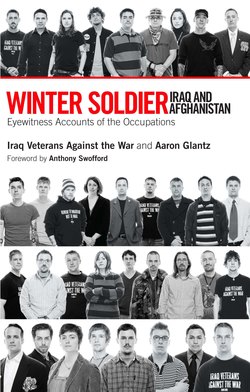Читать книгу Winter Soldier: Iraq and Afghanistan - Aaron Glantz - Страница 7
На сайте Литреса книга снята с продажи.
Foreword Anthony Swofford
ОглавлениеEarly in June of 2008 President Bush awarded the Bronze Star posthumously to Specialist Ross A. McGinnis of the United States Army. McGinnis had done what most civilians would find unthinkable: he’d jumped on an enemy hand grenade that had been thrown into his vehicle. His body took the force of the entire blast and he died instantly, saving four fellow soldiers from certain heinous injury and probable death. His was the selfless act popularized in the culture by Hollywood lore and the macho love talk of tough men: I’d take a bullet for you; I’d jump on a grenade to save so-and-so’s life. No one ever means it. But men and women in battle do. It’s not in any manual. It’s written in the code of the combatant’s heart. It’s the kind of impulse that is part of the reason most people join the United States military in the first place: to serve, to honor, to protect.
The men and women who testified at Winter Soldier Iraq and Afghanistan in March of 2008 displayed the same kind of courage that Specialist McGinnis did: they took individual action and great risk to honor the men and women, American troops and Iraqi civilians, who have died in this misbegotten and often criminally executed war. They didn’t use their bodies; they used their narratives, the bare-knuckle stories that tell us the truth about what happens at the other end of the rifle, the missile, the bomb.
I listened to most of the testimony live that weekend. Despite my service in the Marine Corps during the 1990–1991 Gulf War and my intimate knowledge of the brutality of combat and the systems that prepare one for combat, there were times during the testimony when I found myself in utter disbelief. I call combat a psychosis-inducing situation. But still, the events being narrated by the testifying troops shocked me. You too will be shocked. Your natural tendency will be not to believe.
It will be hard to imagine the same kind of sweet young kid you went to high school with or that your sons or daughters went to high school with telling about warships firing on civilian-inhabited apartment buildings while troops cheer the destruction; it will be difficult to believe the blind blood-thirst a unit lives and kills on after suffering casualties; you do not want to know about the constantly loosening Rules of Engagement that eventually debilitate to the point of allowing troops to shoot anyone who makes them feel unsafe. You won’t want to believe the “incentivizing” one marine captain does: be the first to kill with a knife and you’ll get some extra days off when the unit rotates home.
Tim O’Brien has written that in a war story, the craziest stuff in there—the events a civilian would never believe because they are filled with such violence and depravity—those are the true parts of the story. These are what I call the seared elements: the images and associated narratives of a combatant’s history he or she most wants to forget but never will. In this testimony there are countless seared elements that you the reader will want to forget.
But honor the casualties of this war—the dead, injured, psychologically altered, those who have already managed to heal—by refusing to forget the elements and consequences of combat that our leaders would rather us not know in the first place. Do not turn away from these stories. They are yours, too.
June 2008
